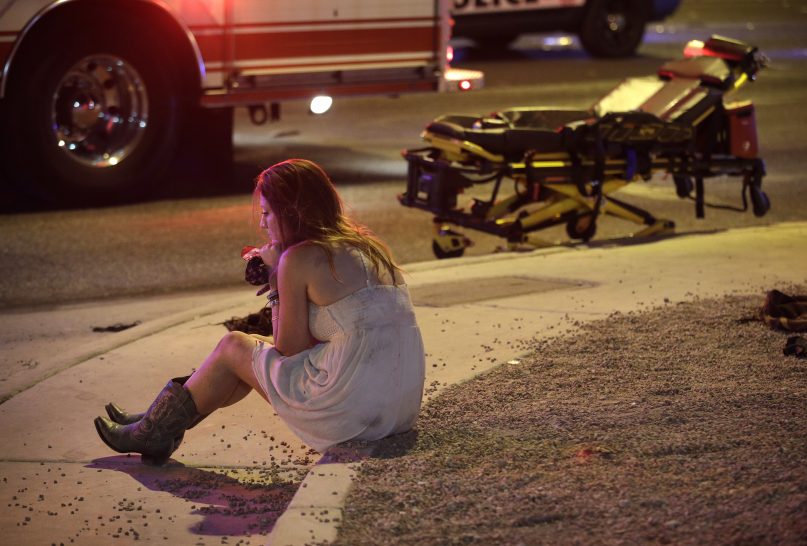I am usually not great at predicting thing. But, I can predict the sermon topic that will be on the lips of just about every rabbi, minister, and imam this weekend.
The horror in Las Vegas.
Many of those sermons will include some reference to “our thoughts and prayers…”
OK, sure. Where else can you express thoughts and prayers, if not in the sanctuaries of our faiths?
But, many of those sermons will go further than that.
Many religious leaders will exhort their congregations to go deeper — straight into action.
They will ask their congregations to work to change our laws in order to make it harder to obtain weapons, or to make it impossible for gun enthusiasts to upgrade their weapons into weapons of mass destruction.
I predict, also, that someone, somewhere in the pews is going to scream: “You’re getting political. We are going to lose our 501 c (3) status!”
Let’s understand what the law says. It says that neither a member of the clergy, nor a congregation itself, can advocate either for or against a particular candidate (though Trump would like to see that law thrown into the trash can).
Beyond that — a house of worship can discuss politics, and can advocate on various issues.
I have turned this clarification into a song — to the “traditional” German melody of Adon Olam:
Your 501 c (3) is safe
Mentioning politics ain’t treif
Speak of ethics, laws, and truth
But not about the voting booth.
You must never advocate
For or against a candidate
Except for that, you’re always free
To strengthen our democracy.
Now, as they say, your mileage may vary. You need to discern the political culture of your congregation. It will depend on many factors — chief among them, geography and demographics.
But, in my experience, those who scream “you’re getting political!” are actually saying two things:
“I come here to pray, and to escape the world. Don’t bother me.” In our decades-old emphasis on inwardness and personal spirituality, we rabbis share some responsibility in fostering that attitude.
We need to remind people of the essential design feature of the synagogue: it needs windows, so that we can see what is going on in the world. And we need to remind people of such figures as Rabbi Abraham Joshua Heschel, who was simultaneously a prophet of the inner life and of outer action.
“I disagree with you, and I will fight to make sure that I will never hear anything that I disagree with. I don’t come here to be challenged.” How sad. As Richard Hofstadter has written, anti-intellectualism has been part of American life since its very founding.
But that Jews should embrace it is nothing less than a betrayal of everything that Judaism stands for.
It wasn’t always this way in the American synagogue.
In my childhood synagogue, the rabbi always made a point of inviting controversial speakers to address the congregation — simply so that we could learn to respond to ideas.
It was in that sanctuary that I heard the late Rabbi Meir Kahane debate another rabbi on the meaning of anti-Semitism.
It was also in that sanctuary that a member of the Black Panthers spoke.
And it was also in that sanctuary that a member of the American Nazi party spoke.
Those programs, maddening as they were, taught me that a synagogue is where you talk about difficult things.
In a better synagogue world, this is what we would hear:
“Wow, I disagree with what the rabbi said! She’s so wrong! I am going to make an appointment to discuss this with her. Maybe I can convince her to change her mind.”
How great that would be. Imagine: inviting your clergy person into a relationship. Some of the congregants that I have loved the most are the ones that I disagree with the most.
Or:
“Wow, I disagree with what the rabbi said! He’s so wrong! But, it’s good to have a rabbi who makes me think, even if we have come to very different conclusions.”
How great would that be. A synagogue as a powerhouse of thought.
Or:
“Wow, I disagree with what the rabbi said! She is so wrong! But, it could be worse, I guess. This synagogue could be boring.”
How great that would be. A synagogue that makes a difference in people’s lives.
So, why should rabbis and other clergy members “get political” when it comes to the issue of guns in our society?
For decades, Republicans in Congress, as well as conservative Democrats, have blocked any legislation that would lessen the possibility of gun deaths.
A decade ago, they blocked efforts to limit the size of magazines after the massacre at Virginia Tech.
Five years later, Republican leaders thwarted bipartisan legislation to expand background checks of gun purchasers after the mass shooting at an elementary school in Newtown, Conn.
Last year, in the wake of the Orlando nightclub massacre, they blocked legislation to stop gun sales to buyers on terrorism watch lists.
But in this week’s massacre in Las Vegas, lawmakers in both parties may have found a kind of common ground, in opposing the availability of gun conversion kits — “bump stocks” — that turn semiautomatic weapons into weapons capable of firing in long, deadly bursts.
This is what we should be doing. Every synagogue, church, and mosque in America should be urging their people to contact their lawmakers and to urge action to get rid of bump stocks, which are actually low cost death machines.
Political?
Some might call it that.
I call it pikuach nefesh — saving a life.
In Judaism, we call that a mitzvah.
Have a joyous Sukkot!






